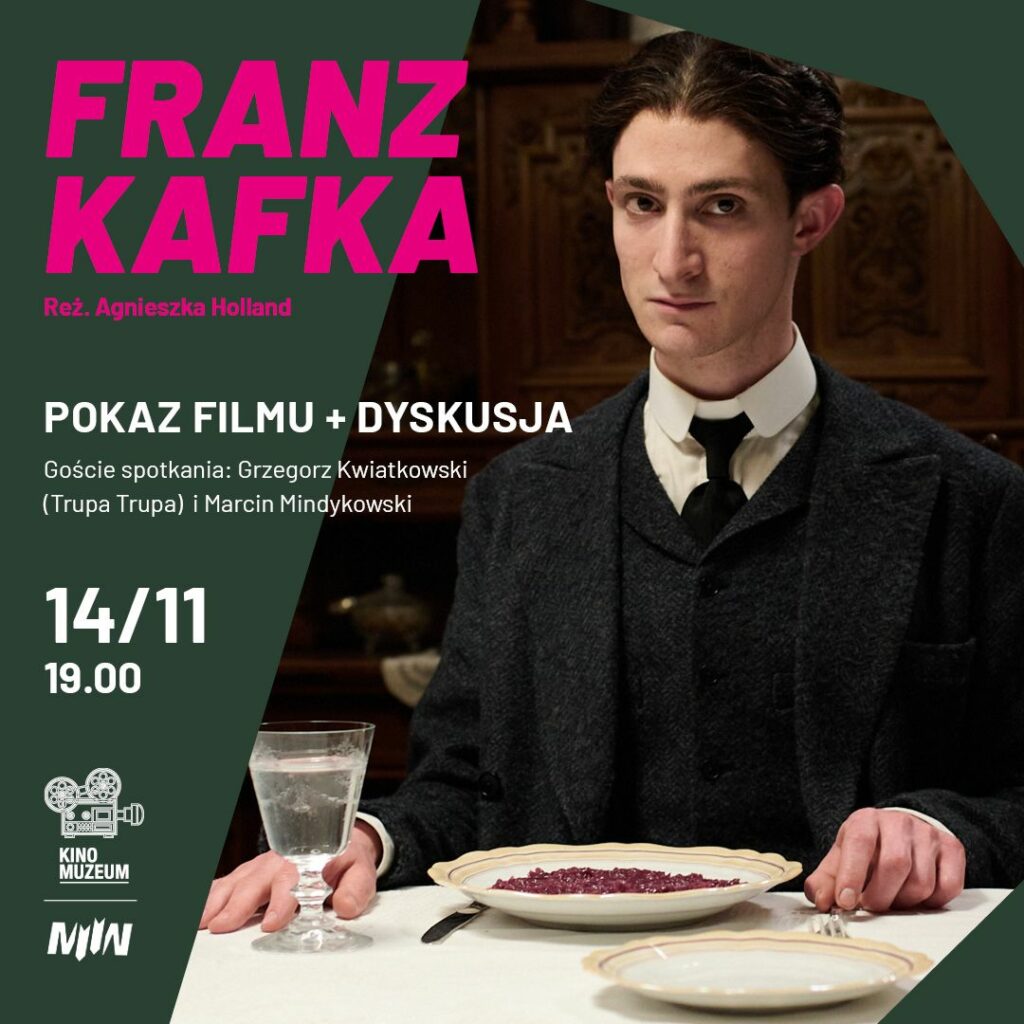Grzegorz Kwiatkowski will take part in a conversation following the screening of the film “Franz Kafka,” directed by Agnieszka Holland. The meeting will take place on November 14 at the Museum of the Second World War. The conversation will be moderated by Marcin Mindykowski.
“Would Franz Kafka listen to the band Trupa Trupa? We will try to answer this and other questions on November 14 at the Museum Cinema. After the screening of “Franz Kafka,” we invite you to a conversation with Grzegorz Kwiatkowski, a member of the band Trupa Trupa, whose music is part of the film. Grzegorz Kwiatkowski is also a writer and artist-in-residence at Yale University. He curates workshops and panels at the University of Oxford, and his artistic work focuses on memory, ethics, and suppressed histories. The conversation will be moderated by Marcin Mindykowski, a Tri-City cultural journalist and film critic.
“Franz Kafka,” the long-awaited international production directed by the award-winning Agnieszka Holland (“The Green Border,” “In Darkness”), is not only a portrait of a twentieth-century literary icon whose work continues to inspire artists and fascinate new generations. It is also the story of a sensitive man whose fears and dilemmas deeply resonate with today’s younger generation. The director follows her protagonist’s path, creating a remarkable mosaic from the most important moments of his life.
Franz Kafka is portrayed as a young man trapped in the nightmare of bureaucratic everyday life, echoing the reality of today’s corporate workers. A vegetarian by choice before it became widespread. The son of a domineering father, entangled in fragile relationships with women. Immersed in an existential crisis long before loneliness became a side effect of social media. Misunderstood and full of anxieties, he escaped into a world of irony, absurdity, and imagination, creating works that made him one of the greatest writers of the twentieth century.
Grzegorz Kwiatkowski is a member of the band Trupa Trupa, whose music appears in the film. He is also a writer and artist-in-residence at Yale University. He curates workshops and panels at the University of Oxford, and his artistic work deals with memory, ethics, and suppressed histories. For years he has been involved in efforts to protect sites of remembrance in Pomerania, including leading a campaign to secure hundreds of thousands of shoes belonging to victims found near the former Stutthof concentration camp, and contributing to the commemoration of the Jewish ghetto on Granary Island in Gdańsk.
The magazine “World Literature Today” will soon publish his essay on the cinema of Agnieszka Holland, Franz Kafka, and the history of Central and Eastern Europe. He also collaborated with Holland on the film “The Green Border,” which features music by Trupa Trupa.
In his poetry, music, activism, and lectures at institutions such as Stanford University, New York University, Columbia University, and the University of Chicago, Kwiatkowski examines themes of ethics, history, and politics and their influence on society. References to the work of Franz Kafka regularly appear in his artistic practice. His poetry collections, published in the United States, Germany, France, Greece, and Slovenia, explore totalitarianism and the history of Central and Eastern Europe, whose past continues to shape the present.
Marcin Mindykowski is a Tri-City cultural journalist and film critic. He holds degrees in journalism and social communication, as well as political science, from the University of Gdańsk. He also completed postgraduate studies in Film Journalism (under the direction of Krzysztof Krauze and Joanna Kos-Krauze) at Collegium Civitas in Warsaw. He has worked for “Dziennik Bałtycki,” Radio Gdańsk, the Polish Radio Second Programme, and the Tri-City edition of “Gazeta Wyborcza.” Since 2024 he has once again been associated with Polish Radio. He has also published in “Kino,” “Ekrany,” and “Jazz Forum.” As a presenter and event host, he collaborates with Pomeranian film festivals and cultural institutions.”


